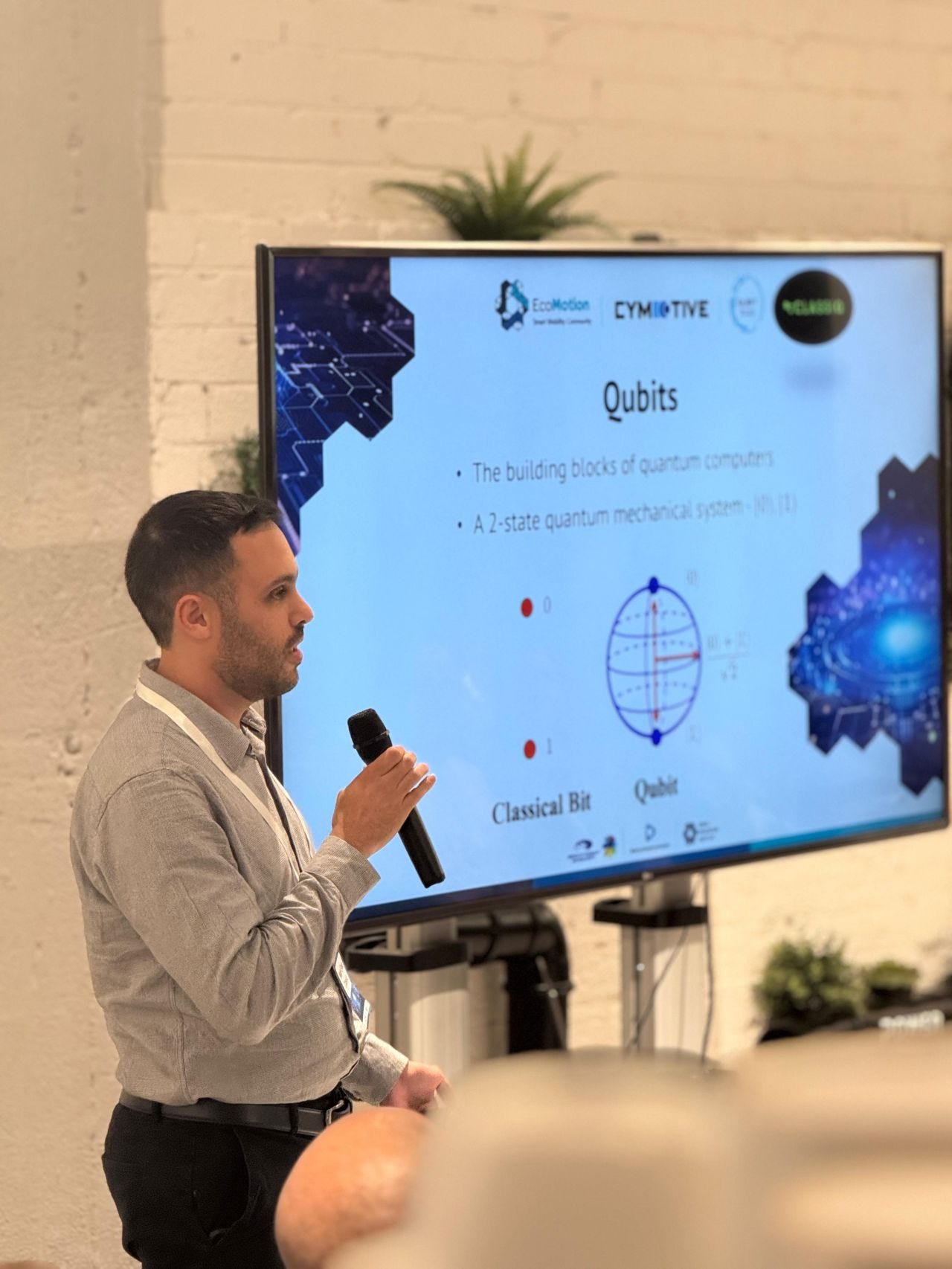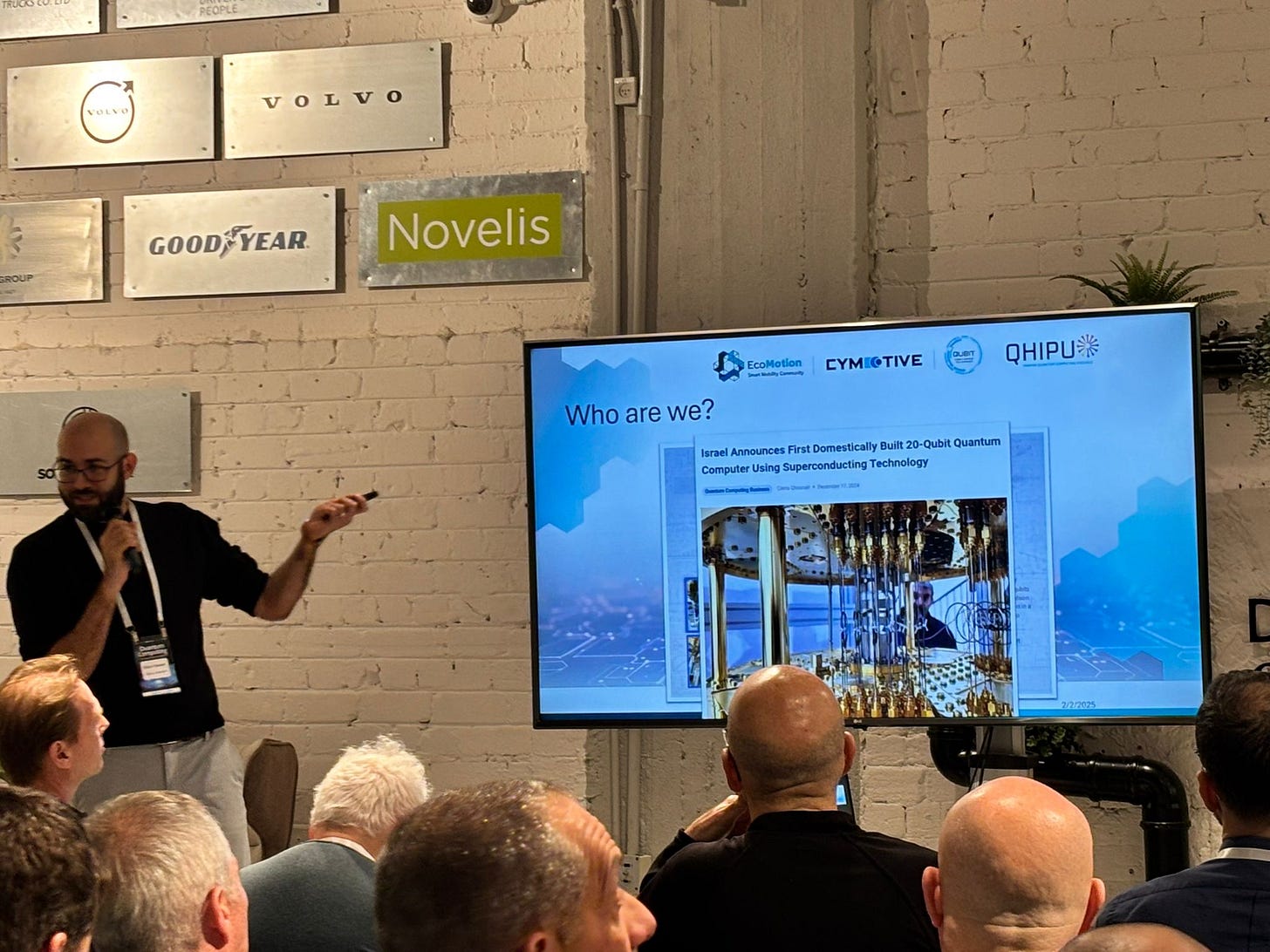Qubit Community Weekly Newsletter #31
Dear Qubit Community,
Welcome to the latest edition of Qubit.IL newsletter, where we dive into the fascinating world of quantum computing, explore groundbreaking advancements, and connect with the vibrant quantum community. Whether you're a seasoned researcher, a curious student, or simply quantum-curious, this is your gateway to staying informed and inspired.
In the 2.2.25, a highly anticipated event on quantum technologies for Automotive drew over 90 attendees – so many that a last-minute venue change was needed due to overwhelming interest!
The energy in the room was electric, reinforcing that while quantum may seem like the future, its mobility applications are already emerging. AI is today’s revolution, but quantum is the next wave—early adopters will lead the transformation.
A big thank you to Eco Motion Community, CyMotive Technologies, Drive TLV and all the speakers and attendees who made this event unforgettable! 🚀
Best Regards,
Qubit.IL Team
Business, Technology and Engineering
QuEra Computing Completes 230 Million Financing to Accelerate Development of Large – Scale Fault – Tolerant Quantum Computers – QuEra renowned for its neutral-atom quantum computing platform, will use the investment to advance its hardware capabilities, expand its team, and strengthen its software ecosystem. This funding underscores the growing confidence in QuEra’s scalable approach to quantum computing, which utilizes atomic qubits for high-performance applications. The investment positions QuEra as a leading player in the quantum race, aiming to deliver practical solutions for industries such as logistics, materials science, and beyond.
For further information: https://thequantuminsider.com/2025/02/11/quera-computing-completes-230-million-financing-to-accelerate-development-of-large-scale-fault-tolerant-quantum-computers/
LightSolver Partners with Ansys to Accelerate CAE Modeling for Automotive and Other Key Industries – LightSolver, a quantum-inspired computing company, has partnered with Ansys, a leader in engineering simulation software, to enhance computer-aided engineering (CAE) modeling for industries like automotive, aerospace, and manufacturing. By integrating LightSolver’s laser-based computing platform with Ansys’ simulation tools, the collaboration aims to solve complex optimization problems faster and more efficiently. This partnership highlights the potential of quantum-inspired technologies to revolutionize design and engineering processes, enabling faster innovation and improved performance in critical industries.
For further information: https://thequantuminsider.com/2025/02/15/lightsolver-partners-with-ansys-to-accelerate-cae-modelling-for-automotive-and-other-key-industries/
Research
Researchers Propose Scalable Alternative to Quantum Volume Benchmark – A team of researchers has introduced a new, scalable benchmark to complement or potentially replace the widely used Quantum Volume metric. The proposed alternative focuses on evaluating quantum systems based on their ability to perform practical, real-world tasks rather than abstract computational power. This approach aims to provide a more meaningful measure of quantum hardware performance, particularly as quantum computers move closer to solving industry-relevant problems. The new benchmark could help guide the development of quantum technologies by aligning performance metrics with practical applications, fostering innovation in areas like optimization, simulation, and machine learning.
For further information: https://thequantuminsider.com/2025/02/11/researchers-propose-scalable-alternative-to-quantum-volume-benchmark/
For the research paper: https://arxiv.org/abs/2502.02575v1
Minimizing Resource Overhead in Fusion-Based Quantum Computation Using Hybrid Spin-Photon Devices – This paper presents three schemes for constructing a (2,2)-Shor-encoded 6-ring photonic resource state for fusion-based quantum computing, each utilizing different photon sources. The authors benchmark these architectures, focusing on their ability to achieve the best-known loss tolerance threshold. They demonstrate that 12 deterministic single-photon sources with a single matter qubit can near-deterministically generate the target resource state using repeat-until-success entangling gates. This modular approach eliminates the need for lossy large-scale multiplexing and reduces resource-state generation overhead by orders of magnitude compared to probabilistic methods. The findings highlight the potential of deterministic single-photon sources with embedded qubits to accelerate the path toward fault-tolerant photonic quantum computation.
Paper's link: https://arxiv.org/abs/2412.08611
Microlaser-Enabled High-Dimensional Quantum Communication Using Spin-Orbit Photon Qudits – This work introduces a breakthrough in quantum key distribution (QKD) by leveraging high-dimensional spin-orbit photon qudits, overcoming the limitations of traditional two-level qubits. Using a non-Hermitian-physics-driven integrated microlaser quantum transmitter, the authors demonstrate the dynamic generation and precise manipulation of multi-degree-of-freedom quantum states. The microlaser emits four homogeneous spin-orbit eigenstates, ensuring stability and eliminating propagation dephasing and walk-off issues. This approach enables high-dimensional secret key generation with high energy efficiency, compactness, and fast reconfigurability. The system’s long-term stability highlights its potential for practical, high-capacity quantum communication networks, marking a significant step toward robust and scalable quantum links.
Paper's link: https://journals.aps.org/prx/abstract/10.1103/PhysRevX.15.011024






